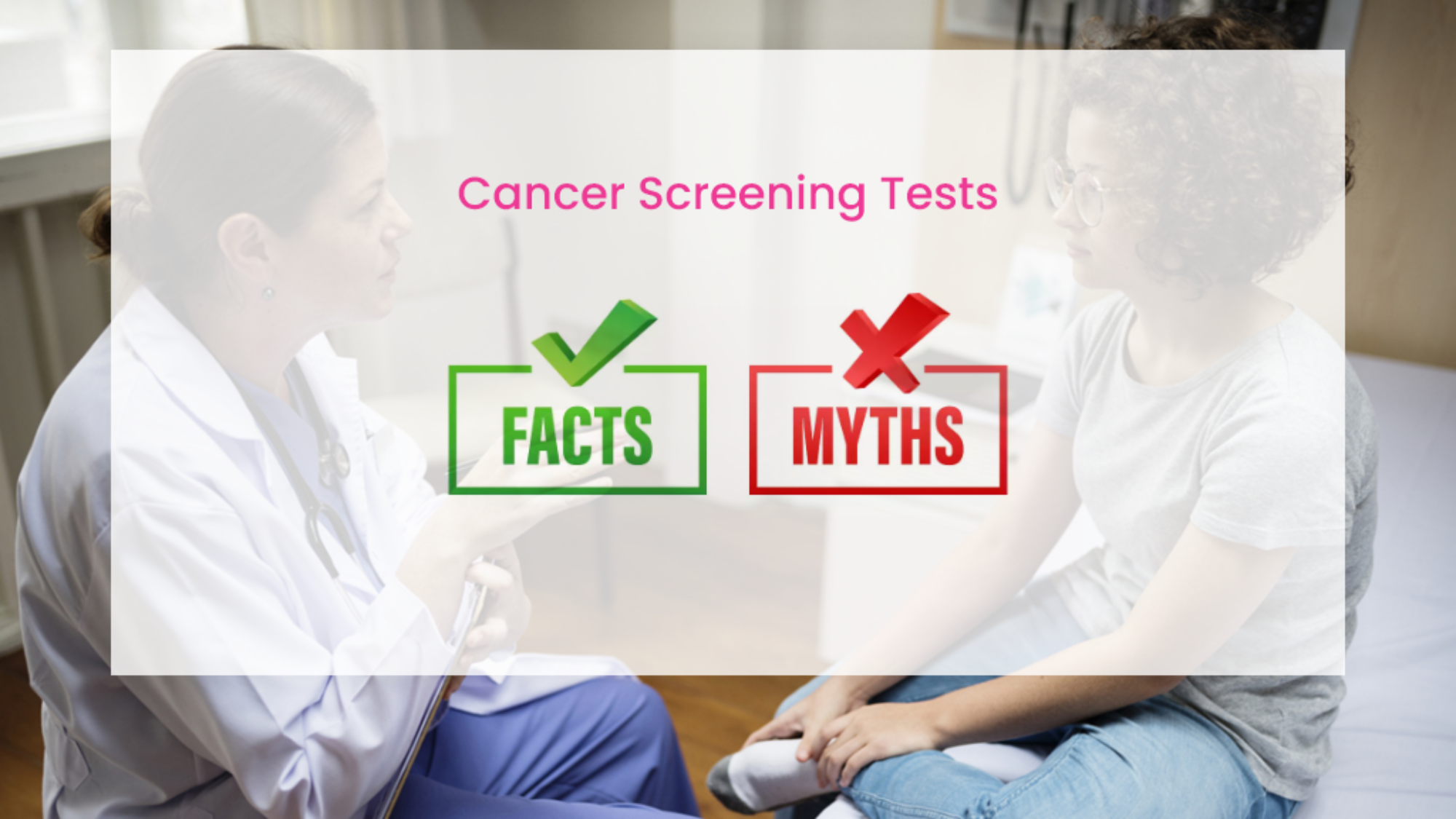In today’s world, cancer remains one of the most prevalent and feared diseases, affecting millions of lives worldwide. As medical science advances, so does our understanding of cancer and the importance of early detection in increasing survival rates and improving treatment outcomes. In the realm of cancer prevention, screening tests play a vital role in identifying potential threats before symptoms manifest, offering a glimmer of hope for timely intervention and better prognosis.
Myths, misconceptions, and conflicting advice often abound, leaving individuals uncertain about the efficacy and relevance of these crucial tests. It is imperative to differentiate between fact and fiction to make informed decisions about our health.
SOME COMMON MYTHS AND FACTS:
Myth 1: Cancer screening tests are unnecessary if you feel healthy.
Fact: Feeling healthy does not guarantee that cancer is not present in your body. Cancer can develop silently and may not cause noticeable symptoms until it has progressed to an advanced stage. Early-stage cancers often do not manifest any signs or symptoms, making regular screenings crucial for early detection. Cancer screening tests are specifically designed to identify potential cancerous changes in their earliest stages, even before symptoms appear. Detecting cancer early increases the chances of successful treatment and improves overall survival rates.
Myth 2: Cancer screenings are too expensive.
Fact: While concerns about healthcare costs are valid, cancer screenings are often more accessible and affordable than one might think. Many countries have public health programs that offer free or subsidised cancer screenings for certain age groups or high-risk populations. Even in countries without universal healthcare, many healthcare providers offer payment plans or financial assistance for those who cannot afford screenings. Government health agencies and local community organisations often collaborate to make cancer screenings more accessible to underserved populations.
Myth 3: Cancer screening tests are painful.
Fact: While some individuals may experience mild discomfort during certain cancer screening tests, the majority of these exams are relatively painless and well-tolerated. It is essential to recognize that the discomfort experienced during screenings is often brief and far outweighed by the potential benefits of early detection.
Myth 4: Cancer screening tests can cause cancer.
Fact: It is a common misconception that cancer screening tests, such as mammograms, Pap tests, or CT scans, can cause cancer. However, the radiation exposure or risks associated with these tests are minimal and generally considered safe for the average person. While cancer screening tests themselves do not cause cancer, it is essential to be mindful of radiation exposure from other medical procedures, such as therapeutic radiation treatments, which may carry higher risks. However, the benefits of these treatments in managing cancer often far outweigh the potential risks.
Myth 5: If I receive a negative result, I’m completely cancer-free.
Fact: A negative result on a screening test does not guarantee that you are entirely free from cancer. Some cancers may not be detectable at early stages or may develop after the screening. It is essential to recognize that cancer screenings are tools designed to identify potential abnormalities and raise suspicion for further evaluation. A negative result should not be taken as an absolute guarantee of being cancer-free. Regular screenings and ongoing communication with healthcare providers are crucial to monitor changes in health and detect potential issues early.
Myth 6: Screening tests are 100% accurate, so I don’t need to worry about false results.”
Fact: While cancer screening tests are valuable tools in detecting potential health issues, they are not 100% accurate. It is essential to understand that false results, both false positives and false negatives, can occur with any screening tests. Several factors contribute to false results, including the sensitivity and specificity of the test, the stage of cancer (if present), and the individual’s risk factors. No single screening test is perfect, and all tests have inherent limitations.
Myth 7: Cancer screenings are only necessary for older individuals.
Fact: Cancer screenings are essential for individuals of varying ages, and the need for screenings is not limited to older adults. While age is a significant risk factor for some types of cancer, cancer can affect people of all age groups, including children, adolescents, young adults, and middle-aged individuals. It is vital to follow the recommended cancer screening guidelines based on age, gender, and individual risk factors.
Myth 8: I have no family history of cancer, so I’m not at risk.
Fact: While a family history of cancer can increase an individual’s risk, it is essential to understand that most cancers occur in individuals without a family history. Many cancers are caused by a combination of genetic, lifestyle, and environmental factors, and having no family history does not eliminate the possibility of developing cancer. The absence of a family history does not mean immunity to cancer. Therefore, taking proactive steps towards preventive healthcare, including regular screenings and healthy lifestyle choices, is vital for everyone.
Myth 9: I had a normal screening last year, so I don’t need to do it again this year.
Fact: Having a normal screening result in the past does not guarantee that you are exempt from future screenings. Regular cancer screenings are an essential part of preventive healthcare, and they should be done according to the recommended guidelines, irrespective of previous normal results. While a normal screening result is encouraging, it is not a guarantee that you are free from the risk of cancer. Embracing regular screenings is a proactive step in taking charge of your health and ensuring timely detection and intervention if needed.


